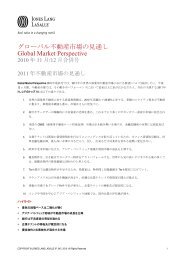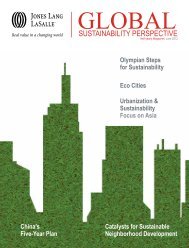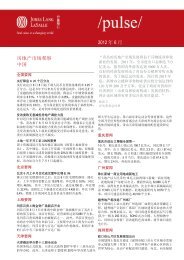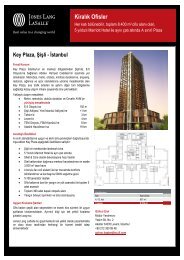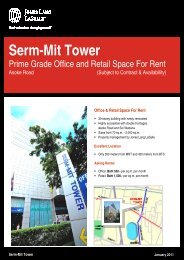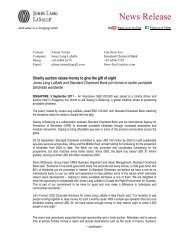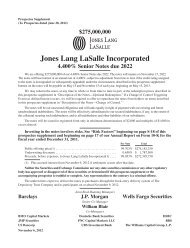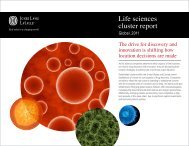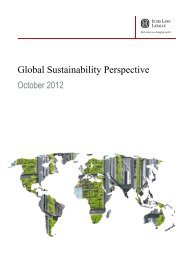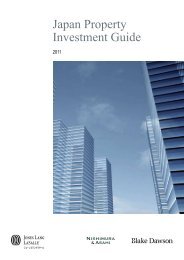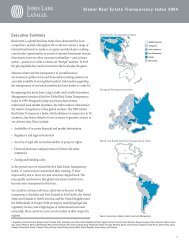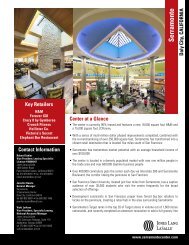Malaysia Property Investment Guide - Jones Lang LaSalle
Malaysia Property Investment Guide - Jones Lang LaSalle
Malaysia Property Investment Guide - Jones Lang LaSalle
Create successful ePaper yourself
Turn your PDF publications into a flip-book with our unique Google optimized e-Paper software.
<strong>Malaysia</strong> <strong>Property</strong><br />
<strong>Investment</strong> <strong>Guide</strong><br />
2011
MALAYSIA<br />
<strong>Property</strong> Tenure/Ownership<br />
Ownership of property is via registered title. Subsequent<br />
transactions are registered against that title.<br />
There are two types of tenure:<br />
•<br />
•<br />
2<br />
Freehold<br />
Leasehold (30, 60 and 99 year term)<br />
Major <strong>Property</strong> Legislation<br />
Control of Rent Act 1966 Control of Rent (Repeal) Act<br />
1997<br />
Environmental Quality Act 1974 Housing Development (Control<br />
and Licensing) Act 1966<br />
Housing Development (Control<br />
and Licensing) Regulations 1989<br />
Housing Development (The<br />
Tribunal for Homebuyer Claims)<br />
Regulations 2002<br />
Housing Development (Housing<br />
Development Account)<br />
Regulations 1991<br />
Housing Development<br />
(Compounding of Offences)<br />
Regulations 2002<br />
Land Acquisition Act 1960 Land Conservation Act 1960<br />
Local Government Act 1976 Malay Reservation Enactment<br />
F.M.S. Cap 142<br />
National Land Code 1965 Real <strong>Property</strong> Gains Tax Act<br />
1976<br />
Stamp Act 1949 State Land Rules*<br />
Strata Titles Act 1985 Street, Drainage and Building<br />
Act 1974<br />
Town and Country Planning Act<br />
1976<br />
Uniform Building By-laws 1984<br />
*In addition, each of the states in <strong>Malaysia</strong> may have its own set of<br />
regulations/rules.<br />
Operational Requirements For Foreign Corporations<br />
Modes of Entry<br />
• Sole Proprietorship and Partnership<br />
•<br />
•<br />
Incorporation of Local Company (private or public limited<br />
company)<br />
Foreign Company (via branch office, regional office, OHQ)<br />
Sole Proprietorship and Partnership<br />
Sole Proprietorship is the simplest form of business in terms of<br />
registration and formulation. As for the form of partnership, the<br />
partners are the joint-owners of the business, and will share the<br />
profits and risks. It is advisable for formal partnership deeds to<br />
be drawn up governing the rights and obligations of each partner<br />
however this is not obligatory.<br />
Sole proprietorship or partnership in <strong>Malaysia</strong> will be personally<br />
liable for the debts of business. All sole proprietorships and<br />
partnerships in <strong>Malaysia</strong> must be registered with the Companies<br />
Commission of <strong>Malaysia</strong> (‘CCM’) under the Registration of<br />
Businesses Act 1956. Only <strong>Malaysia</strong>n citizens and permanent<br />
residents are eligible to register for a sole proprietorship or<br />
partnership.<br />
Incorporation of Local Company<br />
The Companies Act 1965 (‘Companies Act’) governs all companies<br />
in <strong>Malaysia</strong>. The Companies Act stipulates that a person must<br />
register a company with the CCM in order to engage in any<br />
business activity. It provides for three types of companies:<br />
•<br />
•<br />
•<br />
A company limited by shares<br />
An unlimited company<br />
A company limited by guarantee<br />
For the purpose of conducting business in <strong>Malaysia</strong>, the most<br />
common type of company is a company limited by shares where the<br />
personal liability of members is limited to the amount, if any, unpaid<br />
on their shares.<br />
Company Limited by Shares<br />
A company having a share capital may be incorporated as a private<br />
company (identified through the words ‘Sendirian Berhad’ or ‘Sdn.<br />
Bhd.’ appearing together with the company’s name) or public<br />
company (identified through the words ‘Berhad’ or ‘Bhd.’ appearing<br />
together with the company’s name).<br />
Private Company (Sendirian Berhad / Sdn. Bhd.)<br />
A private company limited by shares will have provisions in its<br />
Memorandum and Articles of Associations that:<br />
•<br />
•<br />
•<br />
•<br />
restricts the right to transfer its shares;<br />
limits the number of its members to 50, excluding employees<br />
and some former employees;<br />
prohibits any invitation to the public to subscribe for its shares<br />
and debentures; and<br />
prohibits any invitation to the public to deposit money with<br />
the company.<br />
Public Company (Berhad / Bhd.)<br />
A public company can be formed or a private company can be<br />
converted into a public company, subject to the requirements of the<br />
Companies Act. A public company limited by shares can offer shares<br />
to the public if it has registered a prospectus with the Securities<br />
Commission and has lodged a copy of the prospectus with the CCM<br />
on or before the date of its issue.
A public company can apply to have its shares quoted on Bursa<br />
<strong>Malaysia</strong> (the <strong>Malaysia</strong>n stock exchange) subject to compliance with<br />
the requirements laid down by Bursa <strong>Malaysia</strong> and the Securities<br />
Commission.<br />
Requirements of a Locally Incorporated Company<br />
The requirements to form a company are:<br />
1. A minimum of two subscribers to the shares of the company<br />
(Section 14 CA);<br />
2. A minimum of two directors (Section 122 CA); and<br />
3. A company secretary who can be either:<br />
a. an individual who is a member of a professional body<br />
prescribed by the Minister of Domestic Trade and Consumer<br />
Affairs; or<br />
b. an individual licensed by the CCM.<br />
Both the director and company secretary shall have their principal<br />
or only place of residence within <strong>Malaysia</strong>. Directors of public<br />
companies or subsidiaries of public companies normally must not<br />
exceed 70 years of age. It is not required that a company director<br />
must also be a shareholder.<br />
A company must maintain a registered office in <strong>Malaysia</strong> where<br />
all books and documents required under the provisions of the<br />
Companies Act are kept. The name of the company shall appear in<br />
legible romanised letters, together with the company number, on its<br />
seal and documents.<br />
A company cannot deal with its own shares or hold shares in its<br />
holding company. Each equity share of a public company carries<br />
only one vote at a poll at any general meeting of the company.<br />
A private company may, however, provide for varying voting rights<br />
for its shareholders.<br />
Foreign Company<br />
A foreign company cannot carry on business in <strong>Malaysia</strong> unless<br />
it incorporates a local company or registers the company in<br />
<strong>Malaysia</strong>. Foreign company means a company, corporation, society,<br />
association or other body incorporated outside <strong>Malaysia</strong> which,<br />
under the law of its place of origin, may sue or be sued.<br />
Foreign companies must incorporate a local company or register a<br />
branch in <strong>Malaysia</strong> in order to conduct business in <strong>Malaysia</strong>.<br />
Any documents in a language other than Bahasa <strong>Malaysia</strong> or<br />
English must have an accompanying certified translation. The CCM<br />
will bestow upon the applying company the status of a foreign<br />
company operating in <strong>Malaysia</strong> once all procedures are completed<br />
and approved.<br />
Typical Foreign Business Ventures<br />
The following are the available options for a foreign company that<br />
intends to carry on a business in <strong>Malaysia</strong>:<br />
a. register a branch office if the investor is a foreign company;<br />
b. incorporate a separate <strong>Malaysia</strong>n company as its subsidiary;<br />
c. acquire all or a majority of the shares of an existing <strong>Malaysia</strong>n<br />
company; or<br />
d. enter into a joint venture with a <strong>Malaysia</strong>n company or individual<br />
typically through holding shares in a newly-incorporated joint<br />
venture company.<br />
Branch Office<br />
If the foreign company intends to open a branch in <strong>Malaysia</strong> to<br />
carry on business within <strong>Malaysia</strong>, it has to register with CCM<br />
before it commences business or establishes a place of business<br />
in <strong>Malaysia</strong>, in order for CCM to exert some degree of control over<br />
the affairs of the foreign company in <strong>Malaysia</strong>. The foreign company<br />
that is registered has power to hold immovable property in <strong>Malaysia</strong>.<br />
Such applications can be submitted via management companies<br />
that offer incorporation and company secretarial services to CCM.<br />
Representative Office and Regional Office<br />
Foreign companies involved in the manufacturing and trading<br />
sectors may establish representative and regional offices in<br />
<strong>Malaysia</strong> to perform certain activities for their head office or<br />
principal. Such offices should be totally funded from sources outside<br />
<strong>Malaysia</strong> and are not required to be incorporated or registered with<br />
CCM under the Companies Act.<br />
A representative office collects relevant information regarding<br />
investment and business opportunities to develop bilateral trade<br />
relations and promote the export of <strong>Malaysia</strong>n goods and products.<br />
A regional office serves as the coordination centre for its affiliates,<br />
subsidiaries and agents within the Asia Pacific region. It is<br />
responsible for conducting designated activities within the region<br />
it operates.<br />
Activities allowed to be conducted by a representative office/<br />
regional office are:<br />
•<br />
•<br />
•<br />
•<br />
•<br />
Plan or coordinate business activities<br />
Gather and analyse information or undertake feasibility studies on<br />
investment and business opportunities in <strong>Malaysia</strong> and the region<br />
Identify sources of raw materials, components or other industrial<br />
products<br />
Undertake research and product development<br />
Act as a coordination centre for the corporation’s affiliates,<br />
subsidiaries and agents in the region<br />
<strong>Malaysia</strong> <strong>Property</strong> <strong>Investment</strong> <strong>Guide</strong> 2011 3
MALAYSIA<br />
Activities not allowed to be conducted by a representative office/<br />
regional office are:<br />
•<br />
•<br />
•<br />
•<br />
•<br />
4<br />
Engage in any trading (including import and export), business or<br />
any form of commercial activity<br />
Lease warehousing facilities; any shipment/transhipment or<br />
storage of goods must be carried out through a local agent<br />
or distributor<br />
Sign business contracts on behalf of the foreign corporation or<br />
provide services for a fee<br />
Participate in the daily management of any of its subsidiaries,<br />
affiliates or branches in <strong>Malaysia</strong><br />
Conduct any business transaction or derive income from<br />
its operations<br />
Expatriate posts are allowed in Representative and Regional Offices<br />
depending on the functions and activities of the Representative<br />
Office or Regional Office. Approval for such posts is on a renewable<br />
two-year basis. Expatriates working in Regional Offices are taxed<br />
only on the portion of their chargeable income attributable to the<br />
number of days they are in <strong>Malaysia</strong>.<br />
Approved Operational Headquarters (OHQ)<br />
An approved OHQ generally refers to a company that provides<br />
qualifying services to its offices or related companies regionally<br />
and globally.<br />
A company that establishes an OHQ in <strong>Malaysia</strong> can be<br />
considered for tax incentives and facilities under the OHQ incentive<br />
programme which includes tax exemption for a period of ten years<br />
on income from:<br />
•<br />
•<br />
•<br />
qualifying services rendered to its offices or related companies<br />
outside <strong>Malaysia</strong>;<br />
interest on foreign currency loans extended to its offices or<br />
related companies outside <strong>Malaysia</strong>; and<br />
royalties received from research and development work carried<br />
out on behalf of its offices or related companies outside <strong>Malaysia</strong>.<br />
The qualifying services are as follows:<br />
•<br />
•<br />
•<br />
•<br />
•<br />
•<br />
General management and administration<br />
Business planning and coordination<br />
Coordination of procurement of raw materials, components and<br />
finished products<br />
Technical support and maintenance<br />
Marketing control and sales promotion planning<br />
Data/information management and processing<br />
•<br />
•<br />
•<br />
•<br />
Research and development (R&D) work carried out in<br />
<strong>Malaysia</strong> on behalf of its offices or related companies within<br />
or outside <strong>Malaysia</strong><br />
Training and personnel management for its offices or related<br />
companies within or outside <strong>Malaysia</strong><br />
Treasury and fund management services to its offices or related<br />
companies outside <strong>Malaysia</strong><br />
Corporate financial advisory services to its offices and related<br />
companies outside <strong>Malaysia</strong><br />
An International Procurement Centre / Regional Distribution<br />
Centre<br />
International procurement centre (IPC) is a locally incorporated<br />
company which carries on a business in <strong>Malaysia</strong> to undertake<br />
procurement and sale of raw materials, components and finished<br />
products for its group of related companies and unrelated<br />
companies in <strong>Malaysia</strong> and abroad. This would include procurement<br />
from, and sales made to, local sources and third countries.<br />
A regional distribution centre (RDC) is a collection and consolidation<br />
centre for finished goods, components and spare parts produced<br />
by its own group of companies for its own brand to be distributed to<br />
dealers, importers or its subsidiaries or other unrelated companies<br />
within or outside the country. Among the value-added activities<br />
involved are bulk breaking, repackaging and labelling.<br />
An approved IPC/RDC status company is eligible for full tax<br />
exemption of its statutory income for ten years and dividends paid<br />
from the exempt income will be exempted from tax in the hands of<br />
its shareholders if it fulfils the following criteria:<br />
•<br />
•<br />
Annual sales turnover of at least MYR 100 million.<br />
Sales to the domestic market including sales to free zones (FZs)<br />
and licensed manufacturing warehouses are limited to 20% of its<br />
sales turnover. If sales to the domestic market exceed 20%, the<br />
additional sales will not be exempted from income tax.<br />
Equity Policy in the Manufacturing Sector<br />
Equity Policy for New, Expansion or Diversification Projects<br />
Since June 2003, foreign investors can hold 100% of the equity in<br />
all investments in new projects, as well as investments in expansion/<br />
diversification projects by existing companies, irrespective of the<br />
level of exports and without excluding any product or activity.<br />
The equity policy also applies to:<br />
•<br />
Companies previously exempted from obtaining a manufacturing<br />
licence but whose shareholders’ funds have now reached<br />
MYR 2.5 million or have now engaged 75 or more full-time<br />
employees and are thus required to be licensed.
•<br />
Existing licensed companies previously exempted from complying<br />
with equity conditions, but are now required to comply due to their<br />
shareholders’ funds having reached MYR 2.5 million.<br />
Equity Policy Applicable to Existing Companies<br />
Equity and export conditions imposed on companies prior to<br />
17 June 2003 will be maintained. However, companies can request<br />
for these conditions to be removed and approval will be given based<br />
on the merits of each case.<br />
For more information, go to http://www.mida.gov.my/<br />
Foreign Employment in <strong>Malaysia</strong><br />
Depending on the sector or industry, applications for employment<br />
of expatriates have to be submitted to the relevant agencies and<br />
approved before applications for work permits or submissions<br />
of employment passes for endorsement are submitted to the<br />
Immigration Department. There are six authorised bodies/agencies<br />
which can approve such applications/submissions based on the<br />
core business of the applying company. The agencies and the<br />
corresponding sectors are as follows:<br />
1. <strong>Malaysia</strong>n Industrial Development Authority (MIDA)<br />
a. Manufacturing (new or existing company which is involved in<br />
expansion plan).<br />
b. Manufacturing-related services.<br />
i. Regional office.<br />
ii.<br />
Operating headquarters, overseas mission, international<br />
procurement centre, etc.<br />
c. Hotel and tourism industry.<br />
d. Research and development sectors.<br />
2. Multimedia Development Corporation (MDeC)<br />
a. Expatriate posts and skilled foreign workers in Information<br />
Technology based companies which have been granted<br />
‘Multimedia Super Corridor’ (MSC) status.<br />
3. Public Service Department (PSD)<br />
a. Doctors and nurses in government hospitals or clinics<br />
b. Lecturers and tutors in Government institutes of higher<br />
education (IPTA)<br />
c. Contract posts in public services<br />
d. Recruitment process (job offer by Public Service Commission<br />
(SPA) or related government agencies<br />
4. Central Bank <strong>Malaysia</strong> (BNM)<br />
a. Employment in the banking, finance and insurance sectors.<br />
5. Securities Commission (SC)<br />
a. Employment in the security and share market<br />
6. Expatriate Committee (EC)<br />
a. Employment in private and public sectors other than MIDA,<br />
MDeC, PSD, BNM and SC’s jurisdiction.<br />
Application to MIDA<br />
Companies in the manufacturing sector or companies applying to<br />
operate as an OHQ or IPC or RDC in <strong>Malaysia</strong> may apply to employ<br />
expatriates. The application to employ expatriates depends on the<br />
company’s requirements, subject to the condition that the company<br />
has a minimum paid-up capital of MYR 500,000. A representative<br />
office/regional office of a foreign company based in <strong>Malaysia</strong> is also<br />
allowed to employ expatriates at the managerial and technical level.<br />
The policy on the employment of expatriate personnel for<br />
manufacturing companies is as follows:<br />
•<br />
•<br />
•<br />
•<br />
Manufacturing companies with a foreign paid-up capital of<br />
USD 2 million or above:<br />
-<br />
-<br />
Automatic approval is given for up to ten expatriate posts,<br />
including five key posts.<br />
Expatriates can be employed for up to a maximum of ten years<br />
for executive posts and five years for non-executive posts.<br />
Manufacturing companies with a foreign paid-up capital of at least<br />
USD 200,000 but less than USD 2 million:<br />
-<br />
-<br />
Automatic approval is given for up to five expatriate posts,<br />
including one key post.<br />
Expatriates can be employed for up to a maximum of ten years<br />
for executive posts and five years for non-executive posts.<br />
For manufacturing companies with a foreign paid-up capital of<br />
less than USD 200,000, applications for an expatriate post will be<br />
considered based on the following guidelines:<br />
-<br />
-<br />
Key posts can be considered where foreign paid-up capital is<br />
at least MYR 500,000 and the number of key posts allowed<br />
depends on the merits of each case.<br />
For the duration of employment, up to ten years can be<br />
considered for executive posts that require professional<br />
qualifications and practical experience, and five years for nonexecutive<br />
posts that require technical skills and experience.<br />
However, <strong>Malaysia</strong>ns must be trained to eventually take over<br />
these posts.<br />
<strong>Malaysia</strong>n-owned manufacturing companies will enjoy automatic<br />
approval of applications for the employment of expatriates for<br />
technical posts, including R&D posts.<br />
<strong>Malaysia</strong> <strong>Property</strong> <strong>Investment</strong> <strong>Guide</strong> 2011 5
MALAYSIA<br />
Application to the EC<br />
In relation to the application to the EC, there are a few criteria that<br />
will be considered. They are:<br />
1. Minimum paid-up capital.<br />
The minimum paid-up capital for private limited companies and<br />
public listed companies effective 1 January 2009 is based on the<br />
percentage of equity held by local/foreigners. For 100% locally<br />
owned companies, the paid-up capital is MYR 250,000; for<br />
local and foreign owned companies, the paid-up capital is<br />
MYR 350,000; and for 100% foreign owned companies, the<br />
paid-up capital is MYR 500,000.<br />
2. Recommendations from Ministry/monitoring agencies.<br />
Depending on the field/sector, the related Ministry/agencies have<br />
the discretion/responsibility to make recommendations to the EC<br />
in relation to any application to employ expatriates. The related<br />
agencies and the corresponding field/sector are as follows:<br />
6<br />
a. Ministry of Higher Education/Ministry of Education –<br />
lecturer, tutor and teacher;<br />
b. Ministry of Health – medical doctor, nurse and traditional<br />
medical practitioner;<br />
c. Football Association <strong>Malaysia</strong> – footballer;<br />
d. National Sports Council – athlete and coach;<br />
e. Civil Aviation Department, <strong>Malaysia</strong> – pilot and<br />
civil aviator;<br />
f. Ministry of Tourism – tourism agencies;<br />
g. <strong>Malaysia</strong>n Professional Golf Associates – golf-related activities;<br />
and<br />
h. Biotechnology Corporation of <strong>Malaysia</strong> – biotechnology-related<br />
activities.<br />
3. Registration with the Ministry/monitoring agencies.<br />
Depending on the field/sector, the applying company is required<br />
to register with the related Ministry/agencies. The related Ministry/<br />
agencies and the corresponding field/sector are as follows:<br />
a. Construction Industry Development Board (CIDB)<br />
-<br />
For companies that undertake activities related to<br />
construction and maintenance.<br />
b. Ministry of Domestic Trade, Co-operatives and Consumerism<br />
(MDTCC)<br />
-<br />
For companies with foreign equity involving in wholesaling,<br />
marketing and retailing (including restaurants) and direct<br />
selling.<br />
4. The EC also consider the following criteria:<br />
a. the company’s equity;<br />
b. the company’s activities;<br />
c. local human resource;<br />
d. relevance of the post to the company’s activities;<br />
e. monthly income; and<br />
f. age and working experience.<br />
Application to MDeC<br />
The MDeC only accepts application from companies that have MSC<br />
status. The company’s business plan has to be submitted to MDeC<br />
together with the application to employ an expatriate.<br />
For more information, go to http://www.imi.gov.my/<br />
Foreign <strong>Investment</strong> Incentives<br />
Tax incentives, direct and indirect, are provided for in the Promotion<br />
of <strong>Investment</strong>s Act 1986, Income Tax Act 1967, Customs Act 1967,<br />
Sales Tax Act 1972, Excise Act 1976 and Free Zones Act 1990.<br />
These Acts cover investments in the manufacturing, agriculture,<br />
tourism (including hotel) and approved services sectors as well as<br />
R&D, training and environmental protection activities.<br />
Direct tax incentives grant partial or total relief from income tax<br />
payment for a limited period, while indirect tax incentives come in<br />
the form of exemptions from import duty, sales tax and excise duty.<br />
Manufacturing Sector<br />
Major tax incentives for companies investing in the manufacturing<br />
sector are Pioneer Status and <strong>Investment</strong> Tax Allowance:<br />
1. Pioneer Status<br />
-<br />
-<br />
Companies granted Pioneer Status pay tax on only 30% of<br />
their statutory income, with the exemption granted for five years<br />
commencing from the start of production.<br />
For applications received by 31 December 2010, companies<br />
located in ‘promoted areas’ (i.e. Sabah, Sarawak and the<br />
designated ‘Eastern Corridor’ of Peninsular <strong>Malaysia</strong>) will enjoy<br />
100% tax exemption of their statutory income for five years.<br />
2. <strong>Investment</strong> Tax Allowance (ITA)<br />
-<br />
Companies granted ITA will be given an allowance of 60% of<br />
qualifying capital expenditure incurred within five years from the<br />
date on which the first qualifying capital expenditure is incurred.<br />
The allowance is restricted to a maximum of 70% of their<br />
statutory income for each year of assessment. Any unutilised<br />
allowance can be carried forward to subsequent years until fully<br />
utilised. The remaining 30% of their statutory income will be<br />
taxed at the prevailing corporate tax rate.
-<br />
Companies located in ‘promoted areas’ (i.e. Sabah, Sarawak<br />
and the designated ‘Eastern Corridor’ of Peninsular <strong>Malaysia</strong>)<br />
will enjoy ITA of 100% of the qualifying capital expenditure<br />
within a period of five years. This enhanced incentive is<br />
applicable for all project applications received by 31 December<br />
2010.<br />
3. Reinvestment Allowance (RA)<br />
-<br />
-<br />
-<br />
RA will be granted to a company engaged in manufacturing and<br />
selected agricultural activities that reinvest for the purposes<br />
of expansion, automation, modernisation or diversification of<br />
its existing business into any related products within the same<br />
industry which has been operating for at least 36 months – The<br />
RA is 60% of qualifying capital expenditure, and can be offset<br />
against 70% of the company’s statutory income for each year of<br />
assessment. Any unutilised allowance can be carried forward to<br />
subsequent years until fully utilised.<br />
RA will be given for 15 consecutive years commencing from the<br />
year the first reinvestment is made.<br />
A company can offset the RA against 100% of its statutory<br />
income for the year of assessment if it undertakes reinvestment<br />
projects in the ‘promoted areas’ and the designated ‘Eastern<br />
Corridor’ of Peninsular <strong>Malaysia</strong>.<br />
The main incentives are Pioneer Status, ITA and RA. Other<br />
additional incentives are noted below (under items 4 to 9),<br />
the details of which can be accessed from www.mida.gov.my.<br />
4. Accelerated Capital Allowance<br />
5. Accelerated Capital Allowance on Equipment to Maintain Quality<br />
of Power Supply<br />
6. Accelerated Capital Allowance on Security Control Equipment<br />
7. Incentive for Industrialised Building System<br />
8. Tax Exemption on the Value of Increased Exports<br />
9. Group Relief<br />
Research and Development<br />
Major tax incentives for R&D are as follows:<br />
1. Pioneer Status with tax exemption of 100% of the statutory<br />
income for 5 years – for contract R&D companies.<br />
2. ITA<br />
-<br />
For contract R&D companies and R&D companies – 100% of<br />
the qualifying capital expenditure incurred within ten years can<br />
be offset against 70% of the statutory income in the year of<br />
assessment.<br />
-<br />
For companies that undertake in-house research to further<br />
enhance their business – 50% of the qualifying capital<br />
expenditure incurred within ten years can be offset against 70%<br />
of the statutory income in the year of assessment. 100% for<br />
promoted areas.<br />
3. Second-round incentives of Pioneer Status for another five years<br />
or ITA for a further ten years – for contract R&D companies, R&D<br />
companies and companies that undertake in-house research.<br />
4. Incentives for Commercialisation of Public Sector R&D<br />
eligible for Pioneer Status with income tax exemption of 100%<br />
of statutory income for ten years.<br />
eligible for tax deduction equivalent to the amount of<br />
investment made in the subsidiary company.<br />
5. Double Deduction for R&D<br />
can claim for cash contributions or donations to approved<br />
research institutes, and payments for the use of the services of<br />
approved research institutes, approved research companies,<br />
R&D companies or contract R&D companies.<br />
approved R&D expenditure incurred during tax relief period<br />
for companies with Pioneer Status can be accumulated and<br />
deducted after the tax relief period.<br />
expenditure on R&D activities undertaken overseas, including<br />
training <strong>Malaysia</strong>ns, will be considered on a case-by-case<br />
basis.<br />
6. Incentives for Researchers to commercialise research findings -<br />
50% tax exemption for five years on the income they receive from<br />
the commercialisation of research findings.<br />
Operational Headquarters (OHQs)<br />
• Allowed 100% foreign equity ownership.<br />
•<br />
-<br />
-<br />
-<br />
-<br />
-<br />
Eligible for 100% income tax exemption for ten years provided<br />
conditions are met.<br />
Multimedia Super Corridor (MSC)<br />
1. For MSC Status companies, the financial incentives are:<br />
-<br />
-<br />
Income tax exemption on 100% statutory income, for<br />
ten years<br />
ITA of 100% on the qualifying capital expenditure incurred<br />
within five years to be offset against 100% of statutory income<br />
for each year of assessment<br />
-<br />
R&D grants<br />
<strong>Malaysia</strong> <strong>Property</strong> <strong>Investment</strong> <strong>Guide</strong> 2011 7
MALAYSIA<br />
2. Non-financial incentives include:<br />
8<br />
-<br />
-<br />
-<br />
-<br />
-<br />
-<br />
-<br />
-<br />
Duty-free importation of multimedia equipment, provided the<br />
equipment is being used in the operations of the business<br />
Intellectual property protection and a comprehensive framework<br />
of cyberlaws can be enjoyed by MSC status companies<br />
irrespective of location<br />
No internet censorship<br />
A high-powered implementation agency to act as an effective<br />
one-stop super-shop – the MDC<br />
World-class physical and information infrastructure<br />
Globally competitive telecommunications tariffs<br />
Excellent R&D facilities<br />
High quality, planned urban development, green and protected<br />
environment<br />
For more details on incentives, go to http://www.mida.gov.my/<br />
More details on the MSC can be obtained at<br />
http://www.msc.com.my<br />
Foreign <strong>Property</strong> Ownership<br />
In line with the announcement made by the Government on 30 June<br />
2009 to liberalise property acquisition by foreigners, the Foreign<br />
<strong>Investment</strong> Committee (FIC) guidelines were repealed. Previously,<br />
any acquisition of property by foreign interest requires the approval<br />
of the FIC under the FIC guidelines.<br />
The approval for property acquisitions will now only be required from<br />
the Economic Planning Unit of the Prime Minister’s Department<br />
(EPU) where the acquisition involves a dilution of Bumiputera or<br />
Government interests for properties valued at MYR 20 million and<br />
above, whether acquired directly or indirectly (via the acquisition of<br />
shares in the company that holds the property). All other property<br />
transactions (be it residential or commercial), including those<br />
between foreigners and non-Bumiputeras, will no longer require FIC<br />
approval, subject to a general pricing threshold of MYR 500,000 and<br />
above per unit.<br />
Financing from external and internal sources are allowed for all<br />
acquisition of properties.<br />
Conditions if EPU Approval Required<br />
Where approval from the EPU is required, the proposed acquisition<br />
is subject to equity and paid-up capital conditions as follows:<br />
Equity Condition<br />
a. Companies to have at least 30% Bumiputera interest<br />
shareholding;<br />
Paid-Up Capital Conditions<br />
a. Local company owned by local interest to have at least<br />
MYR 100,000 paid-up capital; and<br />
b. Local company owned by foreign interest to have at least<br />
MYR 250,000 paid-up capital.<br />
For direct acquisition of property, the equity and paid-up capital<br />
conditions imposed by the EPU must be complied with before the<br />
transfer of the property’s ownership.<br />
For indirect acquisition of property, the equity and paid-up capital<br />
conditions imposed by the EPU must be complied with within one<br />
year after the issuance of written approval.<br />
Foreign interest is not allowed to acquire:<br />
a. Properties valued less than MYR 500,000 per unit;<br />
b. Residential units under the category of low and low-medium cost<br />
as determined by the State Authority;<br />
c. Properties built on Malay reserved land; and<br />
d. Properties allocated to Bumiputera interest in any property<br />
development project as determined by the State Authority.<br />
The following transactions are exempted from requiring the<br />
approval of the EPU:<br />
a. Acquisition of residential units by local and foreign interest.<br />
However, a foreign interest is only allowed to acquire a residential<br />
unit valued at more than MYR 500,000 per unit;<br />
b. Any acquisition of a residential unit under the ‘<strong>Malaysia</strong> My<br />
Second Home’ programme;<br />
c. MSC status companies are allowed to acquire any property<br />
in the MSC area provided that the property is only used for<br />
their operational activities, including as a residence for their<br />
employees;<br />
d. Acquisition of interest in a local company that operates in<br />
the approved area in any regional development corridor by<br />
companies that have been granted the status by the local<br />
authority as determined by Government;<br />
e. Acquisition of interest in a company that has obtained the<br />
endorsement from the Secretariat of the <strong>Malaysia</strong>n International<br />
Islamic Financial Centre (MIFC);<br />
f.<br />
Acquisition of residential units to be occupied as a hostel for a<br />
company’s employees. However, local companies owned by<br />
a foreign interest are only allowed to acquire residential units<br />
valued at MYR 100,000 and above and this matter is under the<br />
jurisdiction of the relevant state authorities;<br />
g. Transfer of property to a foreign interest pursuant to a will and<br />
court order;<br />
h.<br />
Acquisition of interest in a manufacturing company;
i.<br />
j.<br />
Acquisition of property by Ministries and Government<br />
Departments (Federal and State), Ministry of Finance<br />
Incorporated, Menteri Besar Incorporated, Chief Minister<br />
Incorporated, State Secretary Incorporated and listed<br />
Government Linked Companies;<br />
Acquisition of interest under a privatisation project, whether at the<br />
Federal or State level, provided that it involves the companies<br />
that are the original signatories in the contracts for the privatised<br />
projects; and<br />
k. Acquisition of interest in companies that have been granted the<br />
status of IPC, OHQ, Representative Offices, Regional Offices,<br />
Labuan offshore companies and Bio-Nexus or other special status<br />
by the Ministry of Finance, Ministry of International Trade and<br />
Industry and other ministries.<br />
State Authority’s Consent still required<br />
Despite the repeal of the FIC guidelines and the limited applicability<br />
of the need to obtain EPU approval, acquisition of properties by<br />
foreigners is still governed by section 433B of the National Land<br />
Code 1965 which stipulates the need to obtain the approval of the<br />
relevant State Authority for any acquisition of interest in property<br />
(other than land categorised for industrial use) by foreigners. In<br />
granting its approval, the State Authority is at liberty to impose<br />
any other conditions as it deems fit. The application will usually be<br />
submitted on the acquirer’s behalf by the local solicitors handling<br />
the proposed acquisition. It should be noted that several states in<br />
<strong>Malaysia</strong> have adopted the EPU’s requirement that the property<br />
purchased by a foreigner must be valued at least MYR 500,000<br />
while some other states have maintained the threshold limit at<br />
the lower level of MYR 250,000. As land matters are within the<br />
jurisdiction of each state, it is advisable to check with local solicitors<br />
on the actual threshold limit applicable to each state in <strong>Malaysia</strong> as<br />
this the threshold limit may vary from state to state and from time to<br />
time without much publicity.<br />
<strong>Malaysia</strong> My Second Home Programme (‘MM2H’)<br />
MM2H programme is promoted by the Government of <strong>Malaysia</strong><br />
to allow foreigners who fulfil certain criteria, to stay in <strong>Malaysia</strong> on<br />
a multiple-entry social visit pass. The Social Visit Pass is initially<br />
for a period of ten years and is renewable. The programme allows<br />
applicants to bring with them their spouses, parents and children.<br />
Foreign spouses of <strong>Malaysia</strong>ns and expatriates who wish to retire<br />
in <strong>Malaysia</strong> after expiry of their Employment Passes are also<br />
eligible to apply to stay in <strong>Malaysia</strong> on this programme. Purchase of<br />
residential units is exempted from EPU’s approval under the MM2H<br />
programme. This programme also allows foreigners to apply for one<br />
domestic maid and bring in his/her own personal car or to purchase<br />
a locally-assembled car without the need to pay import duty, excise<br />
duty and sales tax.<br />
Upon application:<br />
i. Applicants aged below 50 years are required to show proof of<br />
liquid assets worth a minimum of MYR 500,000 and offshore<br />
income of MYR 10,000 per month.<br />
ii.<br />
Applicants aged 50 and above must comply with the financial<br />
proof of MYR 350,000 in liquid assets and off shore income of<br />
MYR 10,000 per month. For those who have retired, they are<br />
required to show proof of receiving pension from governmentapproved<br />
funds of MYR 10,000 per month.<br />
iii. New applicants who have purchased properties worth at least<br />
MYR 1 million qualify to place a lower fixed deposit amount upon<br />
approval.<br />
Upon receipt of conditional approval:<br />
Aged below 50 years old<br />
• Open a fixed deposit account of MYR 300,000.<br />
•<br />
•<br />
After a period of one year, the participant can withdraw up to<br />
MYR 150,000 for approved expenses relating to house<br />
purchases, education for children in <strong>Malaysia</strong> and medical<br />
purposes.<br />
Must maintain a minimum balance of RM150,000 from the second<br />
year onwards and throughout the stay in <strong>Malaysia</strong> under this<br />
programme.<br />
Approved participants who have purchased and own property<br />
which were bought at MYR 1 million and above in <strong>Malaysia</strong> may<br />
comply with the basic fixed deposit requirement of MYR 150,000<br />
on condition that the property has been fully paid and ownership<br />
documents such as grant and land title have already been issued.<br />
This amount may not be withdrawn until the participant decides to<br />
terminate his participation in MM2H programme.<br />
Aged 50 years and above<br />
• Can either choose to:<br />
•<br />
•<br />
-<br />
-<br />
Open a fixed deposit account of MYR 150,000; or<br />
Show proof of government-approved pension funds of<br />
MYR 10,000<br />
After a period of one year, participant who fulfils the fixed deposit<br />
criterion can withdraw up to MYR 50,000 for approved expenses<br />
relating to house purchases, education for children in <strong>Malaysia</strong><br />
and medical purposes.<br />
Participant must maintain a minimum balance of MYR 100,000<br />
from the second year onwards and throughout his/her stay in<br />
<strong>Malaysia</strong> under this programme.<br />
<strong>Malaysia</strong> <strong>Property</strong> <strong>Investment</strong> <strong>Guide</strong> 2011 9
MALAYSIA<br />
Approved participants who have purchased and owned property<br />
which were bought at MYR 1 million and above in <strong>Malaysia</strong> may<br />
comply with the basic fixed deposit requirement of MYR 100,000,<br />
on condition that the property has been fully paid and ownership<br />
documents such as grant and land title have already been issued.<br />
This amount may not be withdrawn until the participant decides to<br />
terminate his participation in MM2H programme.<br />
Medical Report and Medical Insurance<br />
All applicants and their dependents are required to submit a medical<br />
report from any private hospital or registered clinic in <strong>Malaysia</strong>.<br />
Approved participants and their dependents must also possess<br />
valid medical insurance coverage that is applicable in <strong>Malaysia</strong> from<br />
any insurance company. However, exemptions may be given for<br />
participants who face difficulty in obtaining a medical insurance due<br />
to their age or medical condition.<br />
More details are available from http:/www.mm2h.gov.my<br />
Foreign Exchange Controls<br />
A non-resident is permitted by the Controller of Foreign Exchange<br />
to undertake direct or portfolio investment in <strong>Malaysia</strong>, subject to<br />
certain guidelines.<br />
Among the main exchange control requirements are:<br />
•<br />
•<br />
•<br />
10<br />
Foreign direct investment<br />
-<br />
Foreign direct investors are freely allowed to repatriate their<br />
investment, including capital, profits and dividends, without<br />
being subject to any levy.<br />
Portfolio capital<br />
-<br />
-<br />
Capital and profits of portfolio investment are allowed to be<br />
repatriated any time, without being subject to any levy.<br />
No levy is imposed on the repatriation of proceeds from the<br />
sale of immovable property.<br />
Extension of credit facilities to non-residents<br />
Ringgit borrowing:<br />
- Resident non-bank companies, licensed onshore banks<br />
or individuals, may extend any amount of Ringgit credit<br />
facilities to a non-resident provided the utilisation of such<br />
borrowings is to finance activities in the real estate sector in<br />
<strong>Malaysia</strong> or finance/refinance the purchase or construction of<br />
residential and commercial properties in <strong>Malaysia</strong>, excluding<br />
the purchase of land only, subject to their own internal credit<br />
assessment guidelines.<br />
Foreign currency borrowing:<br />
- Non-residents are free to borrow any amount from licensed<br />
onshore banks and licensed International Islamic Banks.<br />
-<br />
Non-residents are free to obtain borrowing from resident nonbank<br />
companies and individuals, subject to the limits (through<br />
conversion of Ringgit up to) of MYR 1 million in aggregate per<br />
calendar year from a resident individual with domestic Ringgit<br />
borrowing, and MYR 50 million in aggregate per calendar<br />
year on a corporate group basis from a resident company with<br />
domestic Ringgit borrowing.<br />
Issuance of bonds/Sukuk in <strong>Malaysia</strong><br />
- Multi Development Banks, Multilateral Financial Institutions,<br />
foreign sovereign, foreign quasi-sovereign agencies and foreign<br />
multinational companies may issue Ringgit or foreign currency<br />
denominated bonds/Sukuk in <strong>Malaysia</strong> and the proceeds from<br />
such issuance are allowed to be used onshore or offshore.<br />
Prior approval from the Securities Commission of <strong>Malaysia</strong> is<br />
required for such issuance.<br />
OHQs<br />
- OHQs are allowed to open foreign currency accounts (FCA)<br />
with licensed onshore banks, licensed international banks and<br />
licensed offshore banks in Labuan or overseas banks for any<br />
purpose except for retaining export proceeds sourced from<br />
non-residents which must be retained in a FCA with licensed<br />
onshore banks only. However, OHQs are not allowed to open<br />
joint foreign currency accounts unless prior permission from the<br />
Controller of Foreign Exchange is obtained.<br />
-<br />
-<br />
-<br />
OHQs are allowed to obtain any amount of domestic credit<br />
facilities in Ringgit provided the Ringgit funds are used<br />
in <strong>Malaysia</strong>.<br />
OHQs are permitted to obtain any amount of foreign<br />
currency credit facilities for their own use from any lender<br />
for any purpose.<br />
OHQs may invest abroad any amount, including extending<br />
credit facilities to their related overseas companies, to be<br />
funded with foreign currency funds or borrowing. They may also<br />
convert any amount if they have no domestic credit facilities or<br />
up to MYR 10 million if they have domestic credit facilities, into<br />
foreign currency per calendar year for investment abroad.<br />
MCS Status Companies<br />
-<br />
Companies incorporated and operating in <strong>Malaysia</strong>’s MSC<br />
as separate legal entities will be exempted from most of the<br />
foreign exchange administration rules once awarded the MSC<br />
status by the MDeC.
Iskandar Development Region (IDR)<br />
- Companies approved by the Ministry of Finance to undertake<br />
qualifying activities under the six targeted service based<br />
sectors in the Iskandar Regional Development Authority (IRDA)<br />
approved zones which is awarded IDR status by IDRA are<br />
granted exemption from most of the provisions of the foreign<br />
exchange administration rules.<br />
More details on foreign exchange controls can be obtained at<br />
http://www.bnm.gov.my, http://www.sc.com.my and<br />
http://www.mida.gov.my<br />
Taxes on Possession and Operation of Real Estate<br />
Quit Rent<br />
No specific tax is levied on property owners. However, individual<br />
State Governments levy a land tax known as Quit Rent. The rate<br />
varies with land category and size.<br />
Assessment<br />
Properties within Local Authorities boundaries are also required<br />
to pay an ‘assessment’. This tax is calculated as a percentage of<br />
annual value and varies with the property type and the location of<br />
the property.<br />
Taxes on Acquisition and Transfer of Real Estate<br />
Stamp Duty and Legal Costs<br />
The stamp duty payable by purchasers of property is based on the<br />
higher of the money value of the consideration or market value at<br />
the following rates:<br />
•<br />
•<br />
•<br />
First MYR 100,000: 1%<br />
Next MYR 400,000: 2%<br />
Remainder (over MYR 500,000): 3%<br />
Legal fees for sales and purchases and charges for completing any<br />
transaction (subject to a minimum of MYR 250) are fixed at rates<br />
based on the consideration or adjudicated value:<br />
•<br />
•<br />
•<br />
•<br />
•<br />
•<br />
First MYR 150,000: 1%<br />
Next MYR 850,000: 0.7%<br />
Next MYR 2,000,000: 0.6%<br />
Next MYR 2,000,000: 0.5%<br />
Next MYR 2,500,000: 0.4%<br />
Remainder: Negotiable but shall not exceed 0.4% of such excess<br />
Capital Gains Tax<br />
The real property gains tax (RPGT) is levied on gains arising from<br />
the disposal of real property situated in <strong>Malaysia</strong> or any interest,<br />
option or other right in or over such land, as well as shares in real<br />
property companies.<br />
The RPGT rates for non-resident individuals are as follows:<br />
Time of Sale Tax Rate<br />
Disposal within 5 years after the date of acquisition 30%<br />
Disposal in the 6th year after the date of acquisition<br />
or thereafter<br />
For foreign companies, the rates are as follows:<br />
Time of Sale Tax Rate<br />
Disposal within 2 years after the date of acquisition 30%<br />
Disposal in the 3rd year after the date of acquisition 20%<br />
Disposal in the 4th year after the date of acquisition 15%<br />
Disposal in the 5th year after the date of the acquisition<br />
or thereafter<br />
By virtue of a Ministerial exemption order, which takes effect<br />
from 1 January 2010, the Minister has exempted the application<br />
of the rates described in the tables above until further order.<br />
Instead, RPGT of 5% will be applicable on gains of disposal of real<br />
properties or real properties companies by any person, including<br />
foreign companies and non-resident individuals.<br />
Service Tax<br />
A service tax of 5% applies to certain prescribed goods and services<br />
in <strong>Malaysia</strong>, including:<br />
•<br />
•<br />
•<br />
food, drinks and tobacco;<br />
5%<br />
provision of rooms for lodging and premises for meetings,<br />
conventions, and cultural and fashion shows;<br />
health services, and provision of accommodation and food by<br />
private hospitals.<br />
The tax also applies to professional and consultancy services<br />
provided by accountants, advocates and solicitors, engineers,<br />
architect, surveyors (including valuers, assessors and real estate<br />
agents), advertising agencies, consultancy firms, management<br />
service providers, insurance companies, motor vehicle service and<br />
repair centres, telecommunication services companies, security and<br />
guard services agencies, recreational clubs, estate agents, parking<br />
space services operators and courier service firms.<br />
However, professional services provided by a company to<br />
companies within the same group will be exempted from the current<br />
service tax of 5%. Courier services provided from a point within<br />
<strong>Malaysia</strong> to a destination outside <strong>Malaysia</strong> will also be exempted<br />
from the service tax of 5%.<br />
5%<br />
<strong>Malaysia</strong> <strong>Property</strong> <strong>Investment</strong> <strong>Guide</strong> 2011 11
MALAYSIA<br />
Generally, the imposition of service tax is subject to a specific<br />
threshold based on an annual turnover ranging from MYR 150,000<br />
to MYR 500,000 such as:<br />
i.<br />
ii.<br />
12<br />
car rental agencies licensed under the Commercial Vehicles<br />
Licensing Board Act 1987 having an annual sales turnover of<br />
MYR 150,000 and above;<br />
employment agencies having an annual sales turnover of<br />
MYR 150,000 and above;<br />
iii. companies providing management services, including project<br />
management and coordination services, having an annual sales<br />
turnover of MYR 150,000 and above; and<br />
iv. hotels having more than 25 rooms and restaurants.<br />
Income Tax<br />
Income of any person including a company, accruing in or derived<br />
from <strong>Malaysia</strong> or received in <strong>Malaysia</strong> from outside <strong>Malaysia</strong> is<br />
subject to income tax.<br />
However, income received in <strong>Malaysia</strong> by any person other than<br />
a resident company carrying on business of banking, insurance or<br />
sea or air transport for a year of assessment derived from sources<br />
outside <strong>Malaysia</strong> is exempted from tax.<br />
The self-assessment system is applicable and the assessment of<br />
income tax is based on a current year basis.<br />
The following sources of income are liable to tax:<br />
•<br />
•<br />
•<br />
•<br />
•<br />
•<br />
gains and profits from a trade, profession and business<br />
gains or profits from employment (salaries, remunerations, etc.)<br />
dividends, interests or discounts<br />
rents, royalties or premiums<br />
pensions, annuities or other periodic payments<br />
other gains or profits of an income nature.<br />
Chargeable income is derived after adjusting for allowable expenses<br />
incurred in the production of the income, capital allowances and<br />
incentives where applicable. Section 34 of the Income Tax Act<br />
1967 allows specific provisions for bad or doubtful debts. However,<br />
no deduction for book depreciation is allowed although capital<br />
allowances are granted. Unabsorbed business losses may be<br />
carried forward indefinitely to offset against business income<br />
including companies with pioneer status, provided that the cessation<br />
of the period falls on or after 30 September 2005.<br />
Corporate Taxation<br />
Resident and non-resident companies are taxed at 25% on net<br />
profits.<br />
Personal Taxation<br />
Income tax is payable by residents on income accruing in or derived<br />
from <strong>Malaysia</strong> as well as on foreign income remitted into <strong>Malaysia</strong>,<br />
subject to certain deductions or allowances. The tax is levied on a<br />
graduated scale ranging from 0% and 26%. Non-resident foreigners<br />
are taxed at 26%.<br />
Tax Treaties: Avoidance of Double Taxation<br />
Treaties in existence:<br />
Albania<br />
Argentina*<br />
Australia<br />
Austria<br />
Bahrain<br />
Bangladesh<br />
Belgium<br />
Canada<br />
China<br />
Chile<br />
Croatia<br />
Czech Republic<br />
Denmark<br />
Egypt<br />
Fiji<br />
Finland<br />
France<br />
Germany<br />
Hungary<br />
India<br />
Indonesia<br />
Iran<br />
Ireland<br />
Italy<br />
Japan<br />
Jordan<br />
Korea, Republic<br />
Kuwait<br />
Kyrgyz, Republic<br />
Lebanon<br />
Luxembourg<br />
Malta<br />
Mauritius<br />
* Limited Agreement<br />
Mongolia<br />
Morocco<br />
Myanmar<br />
Namibia<br />
Netherlands<br />
New Zealand<br />
Norway<br />
Pakistan<br />
Papua New Guinea<br />
Philippines<br />
Poland<br />
Qatar<br />
Romania<br />
Russia<br />
Saudi Arabia<br />
Seychelles<br />
Singapore<br />
South Africa<br />
South Korea<br />
Spain<br />
Sri Lanka<br />
Sudan<br />
Sweden<br />
Switzerland<br />
Syria<br />
Thailand<br />
Turkey<br />
United Arab Emirates<br />
United Kingdom<br />
United States of America*<br />
Uzbekistan<br />
Vietnam<br />
More details on taxation can be obtained at http:/www.mida.gov.my
Real Estate <strong>Investment</strong> Trusts (‘REIT’)<br />
Introduction<br />
The Securities Commission issued a new set of <strong>Guide</strong>lines on<br />
Real Estate <strong>Investment</strong> Trusts on 21 August 2008 (New REITs<br />
<strong>Guide</strong>lines) which supersedes the earlier REIT <strong>Guide</strong>lines issued<br />
on 3 January 2005.<br />
Equity Structure of REIT Manager<br />
Following the measures announced in Budget 2008 to encourage<br />
foreign REIT managers to set up operations in <strong>Malaysia</strong> and list<br />
their REITs on Bursa <strong>Malaysia</strong>, the New REITs <strong>Guide</strong>lines now<br />
allow up to 70% foreign shareholding in the REIT manager.<br />
Permitted <strong>Investment</strong>s<br />
Instead of having different thresholds for listed and unlisted REITs,<br />
the New REITs <strong>Guide</strong>lines has prescribed one threshold for both<br />
listed and unlisted REITs, vis-à-vis at least 50% of a REIT’s total<br />
asset value must be invested in real estates and/or single-purpose<br />
companies at all times; while its investment in non-real estaterelated<br />
assets and/or cash, deposits and money market instruments<br />
must never exceed 25% of a REIT’s total asset value. In addition,<br />
REIT managers are given more freedom to manage their REITs’<br />
portfolio mix, including investment in foreign real estate.<br />
<strong>Investment</strong> in real estate under construction, or real estate where<br />
it does not have a majority ownership and control is permitted<br />
provided that their respective requirements are met. To safeguard<br />
investors’ interest a REIT is not allowed to conduct the activities<br />
of loan advancement, acquisition of vacant land and property<br />
development.<br />
Borrowings and Raising Fund by Issuance of Units<br />
Subject to certain rules of the New REITs <strong>Guide</strong>lines, REIT<br />
managers are now able to raise funds speedily for acquisitions or<br />
capital expenditure purposes. The New REITs <strong>Guide</strong>lines expressly<br />
permits a REIT, in addition to other conventional means of financing<br />
from licensed institutions, to raise funds through the issuance<br />
of debentures. The limit of total borrowings of a fund has been<br />
increased from 35% to 50% of the total asset value of a REIT. Total<br />
borrowings exceeding this limit require the sanction of unit holders.<br />
In order to secure borrowings, the REIT manager may pledge the<br />
fund’s property with the consent of the REIT trustee. In relation to<br />
the issue of units for cash (other than rights issues) concerning a<br />
listed REIT, REIT managers are only required to seek a general<br />
mandate via a resolution in a general meeting from unit holders<br />
for issuance of units up to 20% of its fund size (subject to certain<br />
requirements).<br />
Contrary to the previous guidelines, the New REITs <strong>Guide</strong>lines<br />
have specifically prohibited new REIT units from being placed to<br />
interested persons of the REIT manager, persons connected to<br />
the said interested persons or nominee companies. Otherwise, the<br />
REIT manager must obtain unit holders’ approval for the precise<br />
terms of such issue or placement and interested persons must also<br />
abstain from voting on the resolution.<br />
Related Party Transactions<br />
The New REITs <strong>Guide</strong>lines have introduced specific rules to<br />
regulate related party transactions (‘RPTs’). The term ‘related party’<br />
includes the REIT manager; REIT trustee; major unit holder of the<br />
REIT; director or major shareholder of the REIT manager; or any<br />
person connected with all the preceding parties. All RPTs carried<br />
out by or on behalf of the fund should be carried out at arm’s length<br />
in the best interests of unit holders of the fund, and they should be<br />
adequately disclosed to unit holders.<br />
Real estate transactions must also be consistent with the<br />
investment objective and strategy of the REIT. Further, such RPTs<br />
should, having been consented by the REIT trustee, be transacted<br />
at a price that is equivalent to the value assessed in the valuation<br />
report. However, the New REITs <strong>Guide</strong>lines have also accorded<br />
flexibility so that an RPT may be transacted at a price other than<br />
that in the valuation report. This is provided that, in respect of an<br />
acquisition, the acquisition price shall not exceed 110% of the<br />
value assessed in the valuation report; or in respect of a disposal,<br />
the disposal price is not set below 90% of the reported value. In<br />
the event that the transaction value of a RPT is equal to or greater<br />
than 5% of the total asset value of the REIT (after acquisition), prior<br />
approval of unit holders is required.<br />
Special Tax Exemptions for REITs<br />
Generally, after deducting tax allowable expenses, REIT income<br />
comprising rental, interest and other investment income derived<br />
from or accruing in <strong>Malaysia</strong> will be taxable at the normal corporate<br />
tax rate of 25%. Nevertheless a REIT is exempted from such taxes<br />
in an assessment year if the REIT distributes at least 90% of its<br />
total taxable income to its unit holders in the same assessment<br />
year. REIT’s income is entitled to tax credits upon distribution to unit<br />
holders after being taxed at the REIT level. As gains on disposal of<br />
any investments by a REIT are regarded as capital gains, they are<br />
not subject to income tax.<br />
<strong>Malaysia</strong> <strong>Property</strong> <strong>Investment</strong> <strong>Guide</strong> 2011 13
MALAYSIA<br />
Tax exemption is available on certain REIT income derived from,<br />
among others, investment in securities issued or guaranteed by<br />
the <strong>Malaysia</strong>n government; interest income from Islamic securities<br />
originated in <strong>Malaysia</strong>; interest paid or credited by any licensed<br />
<strong>Malaysia</strong>n banks, and offshore sourced income received by the<br />
REIT from overseas investment. Unit holders will also be exempted<br />
from tax upon distribution if a REIT’s income is exempted pertaining<br />
to the above investments.<br />
14<br />
Unit of Measurement<br />
Unit of Measurement Square Feet<br />
Rental Payments<br />
Rents MYR/month on a gross basis per sq ft, which includes a base rent and service charge<br />
Typical lease term 3 years<br />
Frequency of rent payable (in advance) Monthly<br />
Typical rent deposit (expressed as x months rent) 3 months gross rent<br />
Security of Tenure Only for the duration of the tenancy<br />
Does tenant have statutory rights to renewal No, unless an option to renew is agreed at the outset and specified in the lease<br />
Basis of rent increases or rent review Open market rental value Fixed increases are less common<br />
Frequency of rent increases or rent review Every 3 years<br />
Service Charges, Operating Costs, Repairs & Insurance<br />
Responsibility for utilities Electricty, telecommunication and water consumption are separately metered and payable by<br />
each tenant<br />
Car parking Allocation is usually based on one parking lot per 1,000 sq ft leased Additional lots may be<br />
leased subject to negotiation and availability<br />
Responsibility for internal repairs Tenant<br />
Responsibility for repairs of common parts<br />
(reception, lifts, stairs, etc)<br />
Responsibility for external/structural repairs Landlord<br />
Responsibility for building insurance Landlord<br />
Disposal of Leases<br />
Landlord responsible but costs charged back to tenant via service charge<br />
Tenant subleasing & assignment rights Generally accepted, subject to landlord approval<br />
Tenant early termination rights Only by break clause<br />
Tenant’s building reinstatement responsibilities at<br />
lease end<br />
Source: <strong>Jones</strong> <strong>Lang</strong> <strong>LaSalle</strong><br />
Original condition, allowing for wear and tear<br />
All instruments of transfer or assignment relating to the purchase of<br />
real property between a REIT and the vendor are exempted from<br />
stamp duty.<br />
Gains on disposal of investments by a REIT will not normally be<br />
subject to income tax. However, where the investments represent<br />
real property and shares in real properties companies, such gains<br />
will be subject to RPG. With effect from 1 January 2010, RPGT of<br />
5% will be applicable on gains of disposal of real properties or real<br />
property companies. RPGT is exempted for disposal of real property<br />
or real property companies held for more than five years.
<strong>Jones</strong> <strong>Lang</strong> Wootton<br />
8th Floor Bangunan Getah Asli (Menara)<br />
148 Jalan Ampang<br />
50450 Kuala Lumpur<br />
tel +603-2161 2522<br />
Kadir, Andri & Partners<br />
Tan Kong Yam<br />
Kadir, Andri & Partners<br />
8th floor Menara Safuan<br />
80 Jalan Ampang<br />
50450 Kuala Lumpur<br />
<strong>Malaysia</strong><br />
tel +603 2078 2888<br />
fax +603 2078 8431<br />
kongyam@kaaplaw.com<br />
www.joneslanglasalle.com www.blakedawson.com<br />
<strong>Malaysia</strong> <strong>Property</strong> <strong>Investment</strong> <strong>Guide</strong> 2011 15
<strong>Jones</strong> <strong>Lang</strong> <strong>LaSalle</strong> offices<br />
AUSTRALIA<br />
Adelaide<br />
tel +61 8 8233 8888<br />
Brisbane<br />
tel +61 7 3231 1311<br />
Brookvale<br />
tel +61 2 9938 3122<br />
Canberra<br />
tel +61 2 6274 9888<br />
Glen Waverley<br />
tel +61 3 9565 6666<br />
Liverpool<br />
tel +61 2 8706 0400<br />
Mascot<br />
tel +61 2 9693 9800<br />
Melbourne<br />
tel +61 3 9672 6666<br />
North Sydney<br />
tel +61 2 9936 5888<br />
Parramatta<br />
tel +61 2 9806 2800<br />
Perth<br />
tel +61 8 9322 5111<br />
Sydney<br />
tel +61 2 9220 8500<br />
GREATER CHINA<br />
Beijing<br />
tel +86 10 5922 1300<br />
Chengdu<br />
tel +86 28 6680 5000<br />
Guangzhou<br />
tel +86 20 3891 1238<br />
Qingdao<br />
tel +86 532 8579 5800<br />
Shanghai<br />
tel +86 21 6393 3333<br />
Shenzhen<br />
tel +86 755 2399 6138<br />
Tianjin<br />
tel +86 22 8319 2233<br />
Hong Kong<br />
tel +852 2846 5000<br />
Macau<br />
tel +853 2871 8822<br />
INDIA<br />
Bangalore<br />
tel +91 80 4118 2900<br />
Chandigarh<br />
tel +91 172 3047 651<br />
Chennai<br />
tel +91 44 4299 3000<br />
Coimbatore<br />
tel +91 422 2544433<br />
Delhi<br />
tel +91 11 2331 7070<br />
Hyderabad<br />
tel +91 40 4040 9100<br />
Kochi<br />
tel +91 484 3018652<br />
Kolkata<br />
tel +91 33 2227 3294<br />
Mumbai<br />
tel +91 22 6658 1000<br />
Pune<br />
tel +91 20 3058 6004<br />
INDONESIA<br />
Jakarta<br />
tel +62 21 515 5665<br />
JAPAN<br />
Hokkaido<br />
tel +81 11 218 1919<br />
Osaka<br />
tel +81 6 6282 3777<br />
Tokyo<br />
tel +81 3 5501 9200<br />
KOREA<br />
Seoul<br />
tel +82 2 3704 8888<br />
NEW ZEALAND<br />
Auckland<br />
tel +64 9 366 1666<br />
Wellington<br />
tel +64 4 499 1666<br />
PHILIPPINES<br />
Manila<br />
tel +63 2 902 0888<br />
SINGAPORE<br />
Singapore<br />
tel +65 6220 3888<br />
Taiwan<br />
tel +886 2 8758 9898<br />
THAILAND<br />
Bangkok<br />
tel +662 679 6400<br />
Phuket<br />
tel +667 623 8299<br />
VIETNAM<br />
Hanoi<br />
tel +844 934 4993<br />
Ho Chi Minh City<br />
tel +84 8 3910 3968<br />
Blake Dawson offices<br />
AUSTRALIA<br />
Adelaide<br />
tel +61 8 8112 1000<br />
Brisbane<br />
tel +61 7 3259 7000<br />
Canberra<br />
tel +61 2 6234 4000<br />
Melbourne<br />
tel +61 3 9679 3000<br />
Perth<br />
tel +61 8 9366 8000<br />
Sydney<br />
tel +61 2 9258 6000<br />
Port Moresby<br />
tel +675 309 2000<br />
CHINA<br />
Shanghai<br />
tel +86 21 5100 1796<br />
SINGAPORE<br />
Singapore<br />
tel +65 6438 7886<br />
JAPAN<br />
Tokyo<br />
tel +81 3 5293 8228<br />
Associated Office<br />
INDONESIA<br />
Jakarta<br />
tel +62 21 2996 9200<br />
www.joneslanglasalle.com www.blakedawson.com<br />
© 2011 <strong>Jones</strong> <strong>Lang</strong> <strong>LaSalle</strong>. All rights reserved.<br />
All information contained herein is intended as guide only and does not constitute advice. It does not constitute any offer or part of any contract for sale, lease or otherwise. All details are approximate and have not been independently verified.<br />
Users should make their own enquiries to verify and satisfy themselves of all aspects of the information (including without limitation, any income, rentals, dimensions, areas, zoning and permits). While the information has been prepared in<br />
good faith and with due care, no representations or warranties are made (express or implied) as to the accuracy, currency, completeness, suitability or otherwise of such information. <strong>Jones</strong> <strong>Lang</strong> <strong>LaSalle</strong>, its officers, employees, subcontractors,<br />
agents and clients shall not be liable to any person for any loss, liability, damage or expense arising directly or indirectly from or connected in any way with any use or reliance on such information. The whole or any part of this document must<br />
not be reproduced without written consent from <strong>Jones</strong> <strong>Lang</strong> <strong>LaSalle</strong>.



